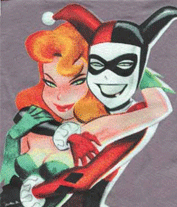May 16, 2005
A column tackling gay issues, gay themes, and just general gayness in television
Out-TakesThe Sex Lives of Supervillians:
It's Not Easy Being Green in Gotham
Ordinarily, I get a little testy when the bad guys are gay. I mean, it's one thing when they're just sort of incidentally queer, or when it's an actual plot point, or when it's not just a big deal. But as superhero stories tend toward the caricature by their very nature, the stereotypes come to the surface easily, and tend toward the offensive, largely for comic value. You know, when the swishy male evildoer or the man-hating female criminal mastermind gets his/her ass kicked by the Defender of Heteronormativity, Masculinity, and the American Way? Yeah. I hate that.
| When you're doing Batman for kids, and kinda have to dodge the brunt of the heavy psychological trauma, Bats himself eventually turns into a one-note broody millionaire. And the bad guys make the heist of their lives ã they steal the show. |
Therefore, it is with great pride and affection that I applaud Poison Ivy (Dr. Pamela Lillian Isley), lesbian eco-terrorist extraordinaire! As far as the animated continuity goes, she's second only to the Joker (once he gets over his terrible pun fetish) for awesomeness, due to her crazy environmentalism, her tremendously sexy voice and her weird flat-footed green ballerina outfit that makes her look kind of like an escapee from a high school production of Peter Pan (but not in the bad way). And unlike other criminal masterminds, she doesn't have delusions of grandeur or wealth — she just likes trees a lot better than she likes people. You almost get the sense that gift memberships to PETA, Greenpeace and the Daughters of Bilitis during her formative years would have saved Gotham a lot of trouble.
Yet Ivy also is unique among Gotham's supervillains in that she's a lady, but she's one of the guys. Though the animated series can often be superbly gender-equitable, it still can't easily shake its faux-1940s noir sexism-as-replicated-in-1992 when it comes to the young, pretty women. Ivy is the only one who escapes from the trap of having to choose between being a male accessory and a man with incidental breasts. When the bad boys get together to play poker and share "almost got 'im!" stories, she's got a place at the table. She gives as good as she gets to the Joker, who knows better than to treat her as anything but an equal. She's not anybody's moll or employee — she's an independent woman with her own highly toxic greenhouse, a woman who knows how to use her sexual availability to manipulate men (poor Harvey) but couples it with a fairly strong man-hating streak.
 |
Of course, independence, feminism and vegetarianism hardly cement one's identity as a lesbian — but in the world of early '90s children's television, they sure do point to something. Whether or not she is sexually attracted to women — and this is children's television, remember, so the only people allowed to be even remotely sexually attracted to anyone else are the precariously kinky duo of Batman and Catwoman — she's definitely not like the other dames. Unlike Red Claw, Ivy's not a mass of criminal muscle that just happens to be female, and unlike Catwoman and Harley, her sexuality isn't diffused by assigning it an outlet. In fact, when she starts behaving in a sexual manner, beware, because she's probably about to poison someone. She's got her own particular "bad guy" gender, which allows her to be highly sexual while at the same time keeping her sexuality entirely under her own control. And that just makes her hot.
In the end, even though she's the villain, and she's got to be taken down and put back in Arkham (where all the good crazy costumed antagonists go), it's just because she's the bad guy, and not because she's a bad person. Heck, Batman even sympathizes with the sentiment behind her crazy eco-terrorism, even if his perpetual boner for justice requires him to condemn her methods. I like to think he's the one that gave her that little potted petunia she pets while she sits in her cell, reads On Our Backs and waits for the chance at her next exciting cartoon caper. It's the least an equal-opportunity crime fighter like the Dark Knight could do.
Next time, on Out-Takes: Our Lady of Cell Block D; or, Frank Black fights for dames and homos!
Email the author.
All written content © 2005 by the authors. For more information, contact homer@smrt-tv.com
